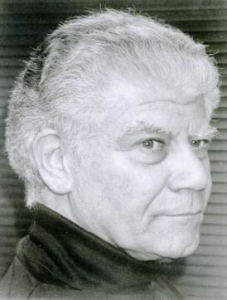#226– November 20, 2023

I.Moondream Escapade
https://youtu.be/lKKvnwlUTIY?si=gpN2VP_15I9D3-Cq
II.Other Voices
https://youtu.be/ZJACwfwncBo?si=RQnPfsm9-i89BJ4h
III.Dances of the Spirits
https://youtu.be/8jCucgQbDlU?si=ZHAGHa2nR47-If_R
Midnight Music by American composer and conductor Irwin Bazelon is our Composition of the Week.
“Midnight Music was commissioned by the Royal Northern College of Music School of Wind and Percussion and was conceived as a tribute to the composer’s New York colleague Richard Rodney Bennett and as a companion piece or a foil for Bennett’s Morning Music.
Atonal, splintered, jagged; the rhythms are dislocated; the forms continuously evolve from tiny fragments; instrumental timbres – the high notes, sometimes with a glissando, of the Eb clarinet in the first movement, say – as often acting as thematic referents, as do motifs. Bazelon has a superb ear for sonorities, for the use of mutes, for the extremes of register, high and low.” (Program notes by Tim Reynish)
“It was my attempt to conjure up all the possibilities implicit in the title Midnight Music. Part I evokes a wild dream sequence. Part II explores the mysterious element, and Part III is an all-out dance of ghosts. Jazz elements are contained in my work not formally but rather in the spirit of the phrasing and dynamics. My music is not descriptive but evocative. I tried to use the different choirs of instruments in the symphonic wind band (brass, winds, saxophones, and percussion) both as protagonists and antagonists, sometimes playing with the orchestra and sometimes against it. Prominence of musical line is determined by dynamics, impact accents, phrasing, rhythmic propulsion, color and contrast.” (Irwin Bazelon)
The work was written in 1991 and premiered a year later, on October 14, 1992, by the Royal Northern College of Music Wind Ensemble, under Tim Reynish.
Irwin Bazelon studied composition at DePaul University with Leo Stein, who fostered Bazelon’s growth as a composer. He graduated with a bachelor’s (1944) and master’s (1945) in music, then continued to Yale University to study composition with Paul Hindemith. Unfortunately, Bazelon could not adapt to Hindemith’s teaching methods and in less than a year moved to Oakland, California, to study with Darius Milhaud at Mills College from 1946 through 1948. Bazelon credits Milhaud as having the greatest influence on the composer’s creative life.
In 1948, the composer moved to New York City where he received numerous fellowships, honors, and commissions. He wrote scores for documentaries, art films, and theatrical productions including two American Shakespeare Festival plays. In 1953, Bazelon also began to write music for commercials.
Irwin Bazelon’s music is known for its interesting rhythms and its emphasis on the brass and percussion sections. In total, Bazelon composed nine symphonies and over sixty orchestral, chamber, and instrumental works. Bazelon’s music lacks any regular pulse, instead it is characterized by unpredictable syncopation, irregular groupings, unexpected triplets, and off-beat accents.
Bazelon did serve as a guest conductor at schools such as Rutgers University, Eastman School of Music, Oberlin College, Rice University, and the University of Virginia. He conducted his music with orchestras such as the National Symphony and the Detroit Symphony. In 1975, Bazelon published Knowing the Score: Notes of Film Music, which marked the end of his commercial career.
In 1983, Bazelon was awarded the Koussevitzky Prize for his contribution to contemporary music, which led to the growth of his international fame.
Other works for winds include:
- Symphonie No.3 (1962)
- Brass Quintet (1963)
- Dramatic Fanfare (1970), for Brass
- Wind Quintet (1975)
- Quintessentials (1983) for chamber ensemble
- Bazz Ma Tazz (1993) for Brass
- Fire and Smoke (1994)


